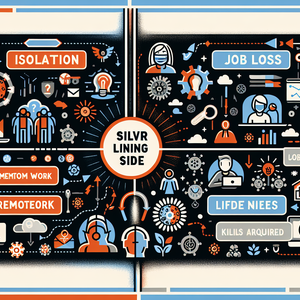The Rise of Remote Work in Switzerland

Before the pandemic, remote work was a relatively niche arrangement in Switzerland, often limited to specific industries and roles. However, as lockdown measures were implemented, companies had to adapt quickly. The Swiss government encouraged businesses to facilitate remote work, leading to a remarkable increase in telecommuting. According to a survey conducted by the Swiss Federal Statistical Office, the percentage of employees working from home surged from 5% pre-pandemic to over 40% at the height of restrictions. This drastic change illustrated not just the necessity of remote work during a crisis but also its potential viability in the long term.
Embracing Flexibility and Work-Life Balance
One of the most significant benefits of remote work is the flexibility it offers. Employees have reported a better work-life balance, allowing them to manage personal responsibilities alongside professional duties. For instance, parents can attend to their children’s needs without sacrificing their career aspirations. Companies like Swiss tech giant Logitech have embraced this shift, enabling their employees to choose when and where they work, which has resulted in increased job satisfaction and productivity. Furthermore, a survey by the Swiss Federal Office for Professional Education and Technology revealed that 78% of employees prefer flexible working hours, indicating a strong demand for arrangements that prioritize individual needs. This flexibility not only enhances the quality of life for employees but also contributes to higher retention rates and lowers absenteeism for organizations.
Impact on Traditional Job Roles
The rise of remote work has also transformed traditional job roles and industries. Sectors that were previously resistant to remote arrangements, such as finance and manufacturing, have found innovative ways to adapt. For instance, Swiss banks like UBS and Credit Suisse have invested in digital tools that allow employees to work from anywhere without compromising service quality. This shift has led to a reevaluation of job descriptions and expectations, as employers recognize that productivity can thrive outside the conventional office environment. In manufacturing, companies have begun to adopt smart technologies that facilitate remote monitoring and management of operations. This has allowed firms to maintain production levels while minimizing the need for physical presence in the workplace, thereby redefining the landscape of job roles in traditionally hands-on industries.
Challenges and Concerns
While the benefits of remote work are evident, challenges remain. The potential for isolation and communication barriers can hinder teamwork and collaboration. Swiss companies are now more aware of the importance of maintaining a strong company culture and fostering connections among remote employees. Initiatives such as virtual team-building activities, regular check-ins, and the use of collaborative tools like Microsoft Teams and Slack are becoming essential to mitigate feelings of disconnection. Moreover, the shift towards remote work raises questions about equity and accessibility. Not all employees have the same ability to work from home effectively. The digital divide in Switzerland means that while some employees thrive in a remote setting, others struggle due to a lack of resources or suitable work environments. Employers must consider these disparities and ensure that remote work policies are inclusive. The Swiss government has also been exploring initiatives to bridge this gap, ensuring that digital literacy and access are prioritized in the workforce.
The Future of Work in Switzerland
Looking ahead, the future of work in Switzerland is likely to adopt a hybrid model that combines the best of both worlds. Many companies are adopting a flexible approach, allowing employees to choose when to work in the office and when to work remotely. This model not only caters to employee preferences but also helps organizations attract and retain top talent in a competitive job market. A report by the Swiss Business Federation indicates that 70% of Swiss companies plan to maintain a hybrid work model post-pandemic. This shift could lead to a more dynamic job market, where geographical boundaries become less relevant, allowing companies to tap into a broader talent pool. As remote work becomes entrenched in the Swiss job market, the landscape of popular jobs is also expected to evolve, with roles in tech, finance, and consultancy leading the demand.
The rise of remote work in Switzerland represents a significant turning point in the job market, driven by necessity and fueled by innovation. As companies and employees navigate this new landscape, it is crucial to address the challenges and embrace the opportunities that come with flexibility. The future of work in Switzerland looks promising, with hybrid models poised to redefine professional life across the nation. By fostering a culture of adaptability and inclusivity, Switzerland can lead the way in creating a resilient workforce that thrives in a post-pandemic world. The embrace of remote work not only highlights the potential for a more balanced lifestyle but also sets the stage for a more innovative and collaborative workforce that is well-prepared to meet future challenges.
Remote UX/UI Designer
Swiss tech companies like Logitech, Zühlke Engineering, and startups in the FinTech sector.
Core Responsibilities
Conduct user research and usability testing to inform design decisions.
Create wireframes, prototypes, and high-fidelity mockups for web and mobile applications.
Collaborate with cross-functional teams including developers and product managers to ensure design integrity.
Required Skills
Proficiency in design tools such as Sketch, Figma, or Adobe XD.
Strong understanding of user-centered design principles and accessibility standards.
Experience with responsive design and familiarity with HTML/CSS.
Cloud Solutions Architect
Major corporations like UBS, Credit Suisse, and various tech startups.
Core Responsibilities
Design and implement scalable cloud infrastructure solutions that align with business objectives.
Evaluate and recommend cloud services and tools, primarily focusing on AWS, Azure, or Google Cloud.
Collaborate with development teams to ensure seamless integration of cloud services into existing systems.
Required Skills
Strong knowledge of cloud architecture best practices and security protocols.
Experience in DevOps practices, including CI/CD pipelines and infrastructure as code (IaC).
Relevant certifications such as AWS Certified Solutions Architect or Microsoft Certified: Azure Solutions Architect Expert.
Remote Digital Marketing Specialist
E-commerce companies, digital marketing agencies, and large enterprises expanding their online presence.
Core Responsibilities
Develop and execute digital marketing strategies across various channels, including social media, email, and SEO.
Analyze campaign performance metrics and adjust strategies to optimize reach and engagement.
Collaborate with content creators to produce compelling marketing materials that resonate with target audiences.
Required Skills
Proficiency in analytics tools such as Google Analytics and social media insights platforms.
Strong understanding of SEO/SEM practices and content marketing strategies.
Experience with marketing automation tools like HubSpot or Mailchimp.
Remote Software Development Engineer in Test (SDET)
Software development companies, tech firms like Swisscom, and financial institutions embracing agile methodologies.
Core Responsibilities
Design and implement automated testing frameworks and scripts for software applications.
Collaborate with developers to identify and resolve software defects during the development process.
Conduct performance testing and ensure compliance with quality standards throughout the software lifecycle.
Required Skills
Proficiency in programming languages such as Java, Python, or C#.
Experience with test automation tools like Selenium, JUnit, or TestNG.
Strong problem-solving skills and a keen attention to detail.
Remote Data Scientist
Financial services firms, healthcare companies, and technology startups focused on data-driven decision-making.
Core Responsibilities
Analyze complex datasets to extract actionable insights and inform business strategies.
Develop predictive models and algorithms using machine learning techniques to solve business problems.
Communicate findings and recommendations to stakeholders through visualizations and reports.
Required Skills
Proficiency in programming languages such as Python or R, and familiarity with data manipulation libraries (e.g., Pandas, NumPy).
Strong statistical analysis skills and experience with machine learning frameworks like TensorFlow or scikit-learn.
Knowledge of data visualization tools such as Tableau or Power BI.


